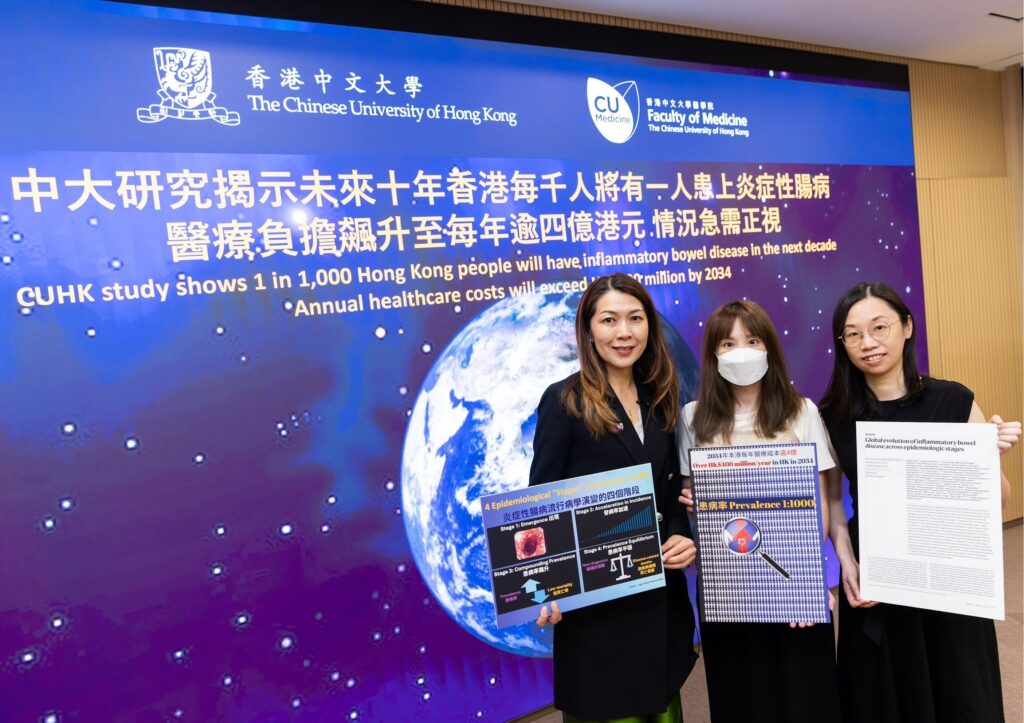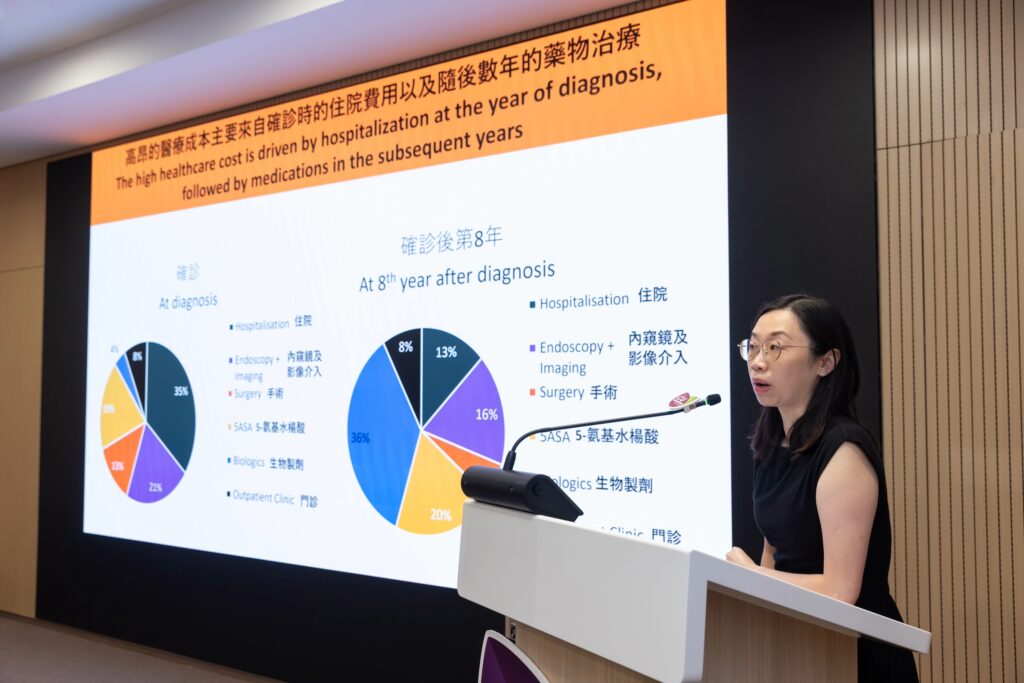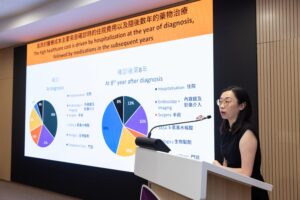CUHK
News Centre
CUHK study shows 1 in 1,000 Hong Kong people will have inflammatory bowel disease in the next decade
Annual healthcare costs will exceed HK$400 million by 2034
Inflammatory bowel disease (IBD), which includes Crohn’s disease (CD) and ulcerative colitis (UC), is a lifelong inflammatory gastrointestinal condition. An epidemiological study jointly led by The Chinese University of Hong Kong (CUHK)’s Faculty of Medicine (CU Medicine) and the University of Calgary has revealed a 30-fold increase in the incidence of IBD in Hong Kong in the past 30 years[1]. Using a machine-learning model, researchers predicted that the prevalence of IBD is expected to rise by 150% over a 20-year period from 2014, with an estimated annual healthcare cost exceeding HK$400 million by 2034, calling for urgent attention. This groundbreaking epidemiological study will help health authorities in Hong Kong prepare for the enormous burden of IBD among an ageing population by formulating prevention, diagnosis and treatment strategies. The findings have been published in leading international scientific journal Nature.
IBD is much more than a sensitive stomach
The effects of IBD are characterised by symptoms of diarrhoea, abdominal pain, weight loss and reduced quality of life. By analysing data from over 500 population-based studies across more than 80 regions over the past century, researchers found that IBD spreads in a predictable pattern through four stages:
- Stage 1: Rare, isolated cases, as seen in parts of Africa today.
- Stage 2: Sharp annual increase in new cases, as observed in Hong Kong.
- Stage 3: Slowing incidence but sharply rising prevalence, common in many Western countries.
- Stage 4: Prevalence stabilises as the IBD population ages and age-related deaths begin to match the number of new cases being diagnosed.
Defining this four-stage framework will help governments, health systems and communities better prepare for the rising global burden of IBD in the years ahead.
1 in 1,000 people projected to suffer from IBD in Hong Kong by 2034
In Hong Kong, the prevalence of IBD was 40 per 100,000 in 2014 (aligning with stage 2) but this figure is projected to rise towards 100 per 100,000 by 2034 – equivalent to a 150% increase over 20 years, approaching the levels observed in Japan. Hong Kong is also witnessing a rapidly rising incidence of newly diagnosed cases; the incidence has risen by 30-fold from 0.1 per 100,000 to 3 per 100,000 in the past three decades[1]. This rise is likely driven by environmental changes associated with modernisation such as shifts in diet, reduced exposure to microbes in early life, and increased antibiotic use and exposure to pollutants.
Annual healthcare costs per IBD patient doubled that of diabetes
Annual healthcare expenditure per IBD patient (about HK$55,000) is double that for a diabetes patient. The steady increase in IBD cases is expected to impose growing medical and economic burdens on Hong Kong’s healthcare system in the coming years. With Hong Kong’s projected population of nearly 8 million in 2034 and an expected prevalence rate of 0.1% under the research model, this implies an annual medical expense for IBD exceeding HK$400 million by 2034. Proactive resource allocation, early diagnosis and innovative treatments are critical to address this burden.
Dr Joyce Mak, Honorary Clinical Associate Professor in the Department of Medicine and Therapeutics at CU Medicine, said: “The age distribution of IBD cases is skewed towards young people, exacerbating the economic burden for working-age adults with IBD or caregivers of children with IBD. Based on the typical age of onset at about 20 years old and an average life expectancy exceeding 80 years, the cumulative healthcare cost per IBD patient will be substantial.”
Rapid surge of IBD calls for innovative diagnostic tools and healthcare strategies
CU Medicine’s research has previously identified bacterial markers in stool and developed a first-in-class microbiome test that can diagnose IBD with high accuracy. Professor Siew Ng, Croucher Professor in Medical Sciences at CU Medicine, Director of the Microbiota I-Center (MagIC) and New Cornerstone Investigator, said: “We need to predict IBD before it starts, prevent it in the general population and detect it early in the disease course. Such measures will help mitigate the imminent socio-economic burden caused by the disease and lead to better patient outcomes.” With the ageing population in Hong Kong, its healthcare systems will be managing an ageing IBD population, with increasing complexity owing to age-related co-morbidities such as diabetes, cancer and cardiovascular disease. Preventive strategies that target the gut microbiome, diet and environmental exposure in at-risk groups to reduce incidence, particularly in early life, are crucial, and innovative healthcare strategies must be designed to address the overall global burden of IBD.
This study was supported by The Leona M. and Harry B. Helmsley Charitable Trust, the International Organization for the study of IBD (IOIBD) and contributions from over 30 international partners.
[1] Around mid-1980s to mid-2010s

The novel machine learning model developed by the global epidemiological study led by CUHK and the University of Calgary reveals that 1 in 1,000 Hong Kong people will have inflammatory bowel disease in 2034, calling for innovative healthcare strategies to address the overall global burden.
(From left) Professor Siew Ng, Croucher Professor in Medical Sciences at CU Medicine, Director of the Microbiota I-Center (MagIC) and New Cornerstone Investigator; IBD patient Ms Yuen; and Dr Joyce Mak, Honorary Clinical Associate Professor in the Department of Medicine and Therapeutics at CU Medicine.

Professor Ng shares the lifelong characteristics of IBD and alerts that Hong Kong has entered stage 2 among the four epidemiological stages of IBD evolution. Accelerating incidence in Hong Kong calls for urgent attention given an ageing IBD population with increasing complexity.

IBD patient Ms Yuen, having undergone years of surgery and medication since being diagnosed at the age of 12, shares how her life has been affected seriously. She highlights the importance of early diagnosis and diet control, and expresses hope for more innovative treatments to benefit more patients.








